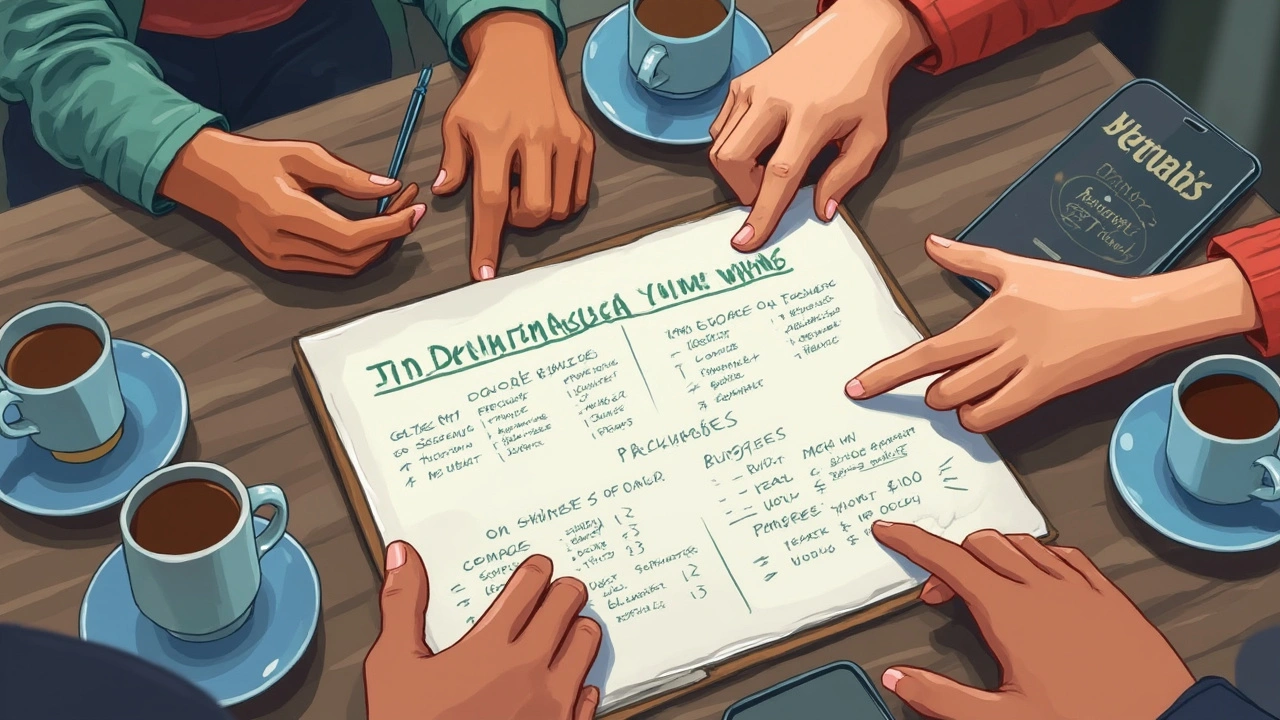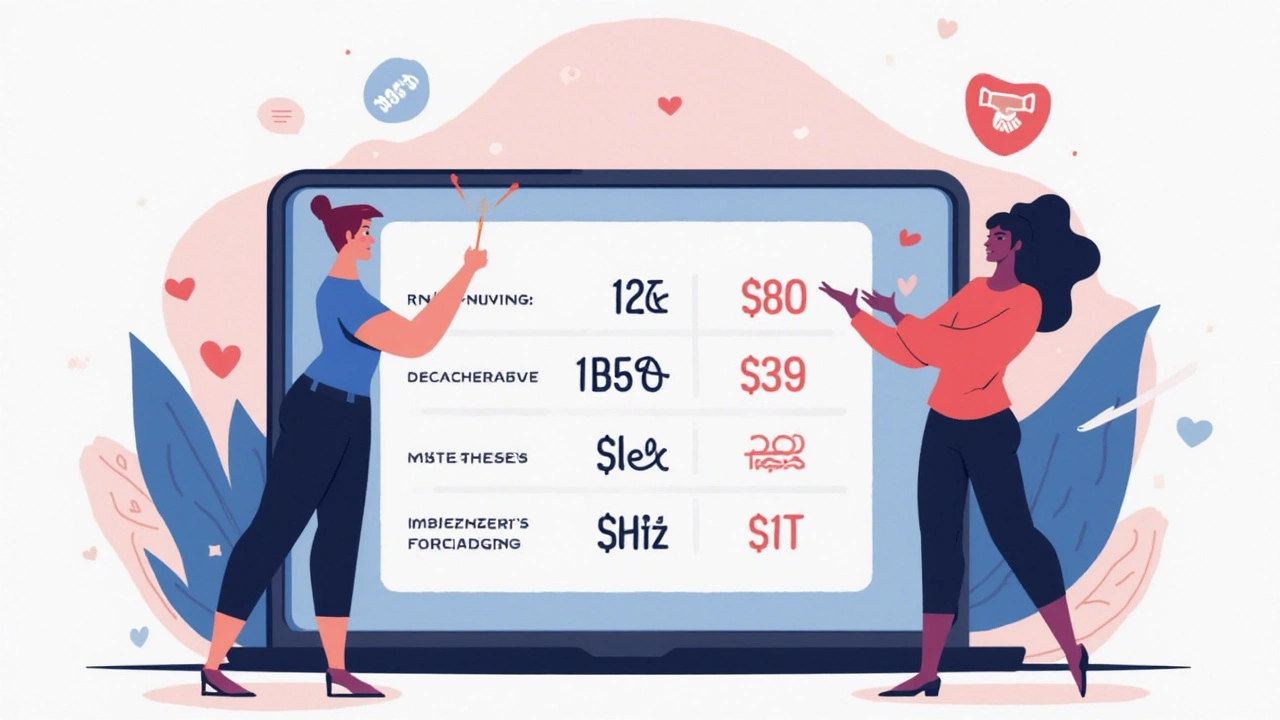Imagine spending more on fancy coffee each month than on sorting out the issues in your relationship. Yet, for a lot of folks, that's exactly how it plays out. Relationship coaching often sounds like a luxury only Instagram couples or Hollywood types can afford, but here’s a surprise: the rates are way more varied—and sometimes more approachable—than you might think. The big question is, how much does a relationship coach charge, and is it worth it? If you’ve ever considered looking into relationship help but got spooked by mysterious fees or vague websites, you’re in the right place. Let’s dig into the real numbers, the fine print, and what actually moves the price tag up or down.
What Affects Relationship Coach Pricing?
If you type “relationship coach near me” into Google, you’ll see wildly different numbers. Some coaches talk about “energy exchanges” and ask for sliding scale payments, while others flash big-ticket session packages in neon lights. Why the gap? Well, unlike regulated fields like therapy, relationship coaching prices aren’t set in stone by a professional board. Everything comes down to five core things: credentials, experience, location, format, and demand.
Credentials matter. Coaches with certifications from organizations like the International Coach Federation or the Relationship Coaching Institute often charge more than someone who read five books and hung up a shingle. That’s not to snub the rookies—sometimes passion counts for plenty—but letters after a name bump up costs. Experience is the next biggie. Someone who’s been at it for fifteen years, worked with high-stakes clients, or appeared on TV will probably cost more than a coach who started post-pandemic.
Location has a funny effect. Coaches in big cities (think New York, LA, or London) charge more thanks to higher living costs and, frankly, bigger wallets among clientele. But many now work online, which levels the playing field a bit. That brings us to format. Some coaches only offer one-on-one sessions; others host workshops or group webinars at a lower per-person rate, making their advice more affordable.
Last up is demand. Hotshot coaches with month-long waiting lists? They know their worth and their price tag will reflect it. Meanwhile, newer coaches (or those targeting underserved communities) might offer discounts or ‘first session free’ deals to build a base. In other words, coaching is as much about the economics of supply and demand as it is about “love languages.”
Common Relationship Coaching Fees and Packages
So, what are we really looking at when we talk about actual numbers? For one-on-one sessions, the typical range is anywhere from $75 to $250 per hour in the United States and the UK. This swings higher if the coach is particularly well-known or specializes in complex issues, like affair recovery or blended families. In Australia and Canada, most coaches price their services between $110 and $220 AUD/CAD per hour.
But it doesn’t stop there. Many coaches encourage clients to buy bulk sessions, which cuts the per-session cost a bit. A three-month package for weekly sessions might run you $900 to $2500. These bundles often toss in incentives like extra email support or emergency call-ins if you and your partner hit a rough patch. It’s the coaching version of a loyalty card, just with less free coffee.
Some coaches are shifting to even more creative pricing. Subscription-based models are popping up, where you pay a flat monthly fee ($200–$500/month is common) for unlimited group workshops, some one-on-ones, and lots of digital resources. This appeals to people who want steady support rather than sporadic crisis management.
Want to check out the numbers side-by-side? Here’s a quick breakdown:
| Coaching Format | Typical Price Range (per session/package) | Extras Included? |
|---|---|---|
| One-on-One (US/UK) | $75 – $250/hr | Sometimes (email/extra calls) |
| One-on-One (AUS/CAN) | $110 – $220/hr | Varies |
| Package Deal (US/UK) | $900 – $2500 (3 months) | Yes (priority scheduling, check-ins) |
| Group Coaching/Workshops | $20 – $60 per person/session | Workbooks, post-class forums |
| Monthly Subscription | $200 – $500/month | Workshop access, DMs, digital resources |
Bear in mind, some coaches don’t list any prices up front, preferring to do a free “chemistry” call to see if you click—and then break out the cost. If you’re nervous about sticker shock, ask for prices before the first real session. Good coaches won’t be cagey.

Is Coaching Ever Covered By Insurance or Employee Benefit Plans?
This is where things get tricky. Unlike therapists or psychologists, relationship coaches usually aren’t recognized by medical insurance. They don’t diagnose or treat mental health issues, so insurance companies see coaching as a “self-improvement” service—kinda like hiring a personal trainer. If you’re hoping to bill your insurance, don’t get your hopes up, even if your coach has an impressive cert framed on the wall.
But don’t write it off entirely. Some progressive companies are starting to see the value in happy employees with low drama at home. A few large corporations in the U.S., especially in tech and finance, sneak coaching into their Employee Assistance Programs (EAPs). If you work for an employer with robust mental wellness benefits, take a second look at your EAP. Marital or relationship coaching might be hiding under the “wellness” umbrella, either as reimbursement or direct access. Still, that’s rare and more often found in big companies rather than your neighborhood bakery.
Tax breaks don’t exist either, unless your coach can credibly argue that your sessions are essential for your work performance (good luck getting your accountant to sign off on that deduction). For the most part, expect to pay out of pocket.
What Do You Actually Get For The Money?
Shelling out $150 for a 50-minute session can make even committed couples hesitate. So, what really happens during relationship coaching, and is it different from therapy? Big time. Coaching is less about the past and more about present habits and future goals. A great coach won’t dig into your childhood or diagnose disorders. Instead, they’ll focus on communication patterns, conflict, emotional intelligence, and actionable homework.
Most coaches start with a goal-setting session. This is where you identify pain points (“We keep arguing about chores” or “Our spark is dead”). Next, many use assessments (like the Enneagram or the Five Love Languages quiz) to pinpoint mismatches in needs and habits. From there, it’s all action plans. Coaches will often assign couples tasks for the week, like “have one screen-free meal together” or “try a new apology script.”
A sign of value? Look for coaches who send follow-up summaries after each session so you don’t lose the thread once the Zoom window closes. Some offer recorded sessions (with permission) or worksheets to keep couples accountable. Practically speaking, you’re buying structure, accountability, and expertise. Research by BetterHelp in 2023 found that over 80% of clients reported increased satisfaction and better communication after even short-term coaching—proof that the right help is sometimes worth the price of admission.
Don’t expect magic fixes. Even the best coach can’t “save” a relationship if both partners aren’t on board, but they can guide you toward practical change. And if you’re single? Coaches often work one-on-one to diagnose dating patterns and build confidence, so don’t write off coaching if you’re not currently coupled up.

Tips For Making The Most Of Your Relationship Coaching Budget
Dropping your hard-earned cash on a relationship coach isn’t something you do lightly. So how do you make sure you get value? Start by getting real clear on your goals. Go into your intro call with a sense of what you want—better communication, more intimacy, fewer arguments. If you’re vague, the coach can’t tailor their work, and that can turn sessions into expensive venting with no results.
Ask outright about the coach’s methods, their credentials, and their cancellation policy. Are sessions 45 minutes or a full hour? Will you get homework or resources beyond meetings? Some coaches toss in bonus email support or crisis calls; others charge extra. If you’re price-sensitive, consider group programs. They’re affordable, and you get the bonus of seeing other couples work through similar issues. Many top-rated coaches offer free first sessions, so sample a few before committing.
- Try multiple chemistry sessions to compare style and fit before signing a package.
- Split sessions with a partner whenever possible for shared benefit.
- Don’t be afraid to ask for payment plans—most coaches offer flexibility if you just ask.
- Look for workshops or monthly subscription models if you want ongoing help but not a sky-high bill.
- Watch out for coaches who promise miracle results or refuse to talk about cost transparency.
Remember, paying for a *relationship coach* is investing in less stress and hopefully, fewer painful breakups or misunderstandings down the line. The best coaches will help you see tangible progress within a handful of sessions. If you’re still stuck and out a few hundred bucks after months? Time to move on to a different pro—or maybe rethink what you want from coaching altogether.


Written by Eldridge Fairweather
View all posts by: Eldridge Fairweather